The Nevada lease agreement generates a contract allowing an individual to take residence of a dwelling for a designated period and monetary amount. The lease paperwork serves to protect both parties by spelling out all terms and conditions to be abided by for the contract duration. Execution of the document by the tenant and landlord solidifies the agreement and creates a binding legal arrangement.
Lease Agreements By Type
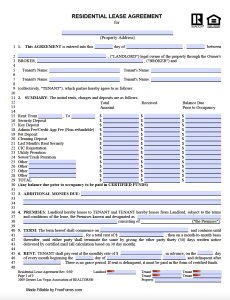 Nevada Association of Realtors Residential Lease Agreement – A documenting accord produced by the organization Realtors stationed in the greater Las Vegas area. The form is distributed to those wanting to secure housing to rent and will assign rights and expectations of the lessor and lessee.
Nevada Association of Realtors Residential Lease Agreement – A documenting accord produced by the organization Realtors stationed in the greater Las Vegas area. The form is distributed to those wanting to secure housing to rent and will assign rights and expectations of the lessor and lessee.
Download: PDF
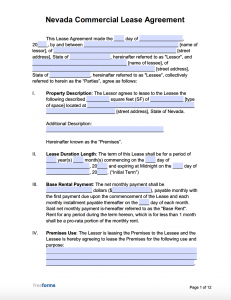 Commercial Lease Agreement – Compels a legal statement containing the specifics for business use of a rental property.
Commercial Lease Agreement – Compels a legal statement containing the specifics for business use of a rental property.
Download: PDF, Word (.docx)
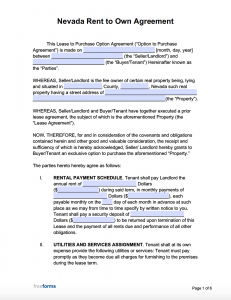 Lease to Own Agreement – Propagates a leasing contract for a residence where the tenant is offered the chance to purchase the real estate upon conclusion.
Lease to Own Agreement – Propagates a leasing contract for a residence where the tenant is offered the chance to purchase the real estate upon conclusion.
Download: PDF, Word (.docx)
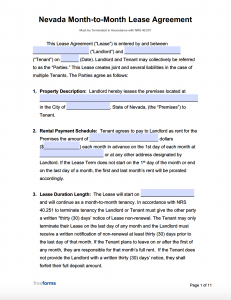 Month-to-Month Lease – Forms a documented account of the understanding of the rental of a dwelling for a signified period and monetary amount. Either party has an extended opportunity to end the agreement early with notification of thirty (30) days prior.
Month-to-Month Lease – Forms a documented account of the understanding of the rental of a dwelling for a signified period and monetary amount. Either party has an extended opportunity to end the agreement early with notification of thirty (30) days prior.
Download: PDF, Word (.docx)
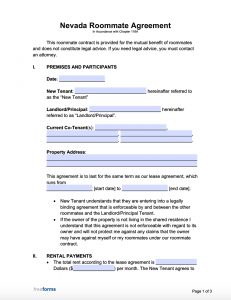 Roommate Agreement – Develops a contract for a renter or owner to extend the shared use of the space to another user.
Roommate Agreement – Develops a contract for a renter or owner to extend the shared use of the space to another user.
Download: PDF, Word (.docx)
Standard Lease Agreement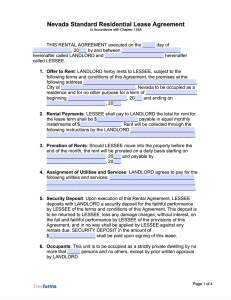 – Conceives a viable organization of the promises put forth by a landlord and tenant to rent a residential piece of real estate.
– Conceives a viable organization of the promises put forth by a landlord and tenant to rent a residential piece of real estate.
Download: PDF, Word (.docx)
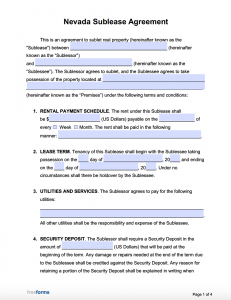 Sublease Agreement – Creates an arrangement allowing for a different individual to assume the lease for a present tenant.
Sublease Agreement – Creates an arrangement allowing for a different individual to assume the lease for a present tenant.
Download: PDF, Word (.docx)
Landlord-Tenant Laws
The fundamentals regarding the regulation of relationships between lessors and lessees are expanded upon within the following chapters of the Nevada Revised Statutes: Chapter 118 – Discrimination in Housing; Landlord and Tenant and Chapter 118A – Landlord and Tenant: Dwellings.
Required Landlord Disclosures
Identification of the Landlord or Authorized Personel (§ 118A.260) – All owners and managing officials are required to be listed as so within the documenting agreement. Updated addresses are to provided and maintained for the benefit of the tenant.
Fee Statement (§ 118A.200) – All fees associated with the signing and duration of the lease agreement are to be itemized within the contents of the contract.
Move-In Checklist (§ 118A.200) – Property lease agreements must include a written register of residence conditions upon entering into the lease. This information is utilized for future reference as a comparison to the state at lease-end.
Emergency Telephone Information (§ 118A.260) – The rental agreement is obligated to include the phone number to contact in case of an emergency on the premises.
Procedure for Reporting a Nuisance or Violation (§ 118A.200) – Information must be reported at lease execution on the proper steps to take should the tenant witness a violation of a building, health or safety code. The same procedure must be informed on handling a nuisance on the property.
Notification of Transfer of the Property (§ 118A.244) – Properties that are transferred during the term of tenancy will require that the landlord informs of the current tenant of the transfer. The new owner’s name address and telephone number must be supplied to the tenant in writing. Notification of the status of the tenant’s security deposit is to be explained as well, and either reimbursed or transferred to the new owner with no possibility of an additional required earnest money request.
Lead-Based Paint (42 U.S. Code § 4852d) – Buildings constructed in 1978 or earlier will demand additional warning of the potential threat caused by exposure to lead-composed paints. An informational brochure and disclosure statement are to be presented along with leasing paperwork by the instruction of the federal government.
Notice of Foreclosure Proceedings Associated with the Property (§ 118A.275) – Prospective tenants must be informed before signing a lease agreement if the residence is in the process of foreclosure.
When is Rent Late?
Payments received later than the contracted due date are not permitted in the state-sanctioned grace period.
Late Fees
There is not an accepted maximum amount that a landlord can suggest as a penalty for late rental payment. Any demanded late fee must be presented explicitly in the signed lease agreement to be enforceable by law.
NSF Checks
Nevada does not pose a legal limit as to the amount that can be requested as a fee on checks returned for insufficient funds. For a charge to be imposed, it must be designated in the leasing paperwork to be demanded.
Security Deposit Maximum
The upper-most limitation on the amount that a landlord can ask for to be held in earnest as a security deposit is equal to three (3) months’ rental payments (§ 118A.242).
Security Deposit Return
Upon termination or early departure from the lease, the owner is mandated to supply repayment for the security deposit within thirty (30) days. The reimbursement is to include the full deposit amount, unless deductions for reasonable cleaning or repair is required, in which the owner must account for the deductions. The deposit or remaining deposit must be sent along with any necessary accounting of expenses to the tenants forwarding or last known address (§ 118A.242).
Landlord’s Entry
For purposes of maintaining the building, repair, or reconditioning, the managing agents for the unit are allowed to enter the premises with at least twenty-four (24) hour advance notice to the tenant. Emergency circumstances will enable a landlord to the right to gain entry without the need for a notification (§ 118A.330).


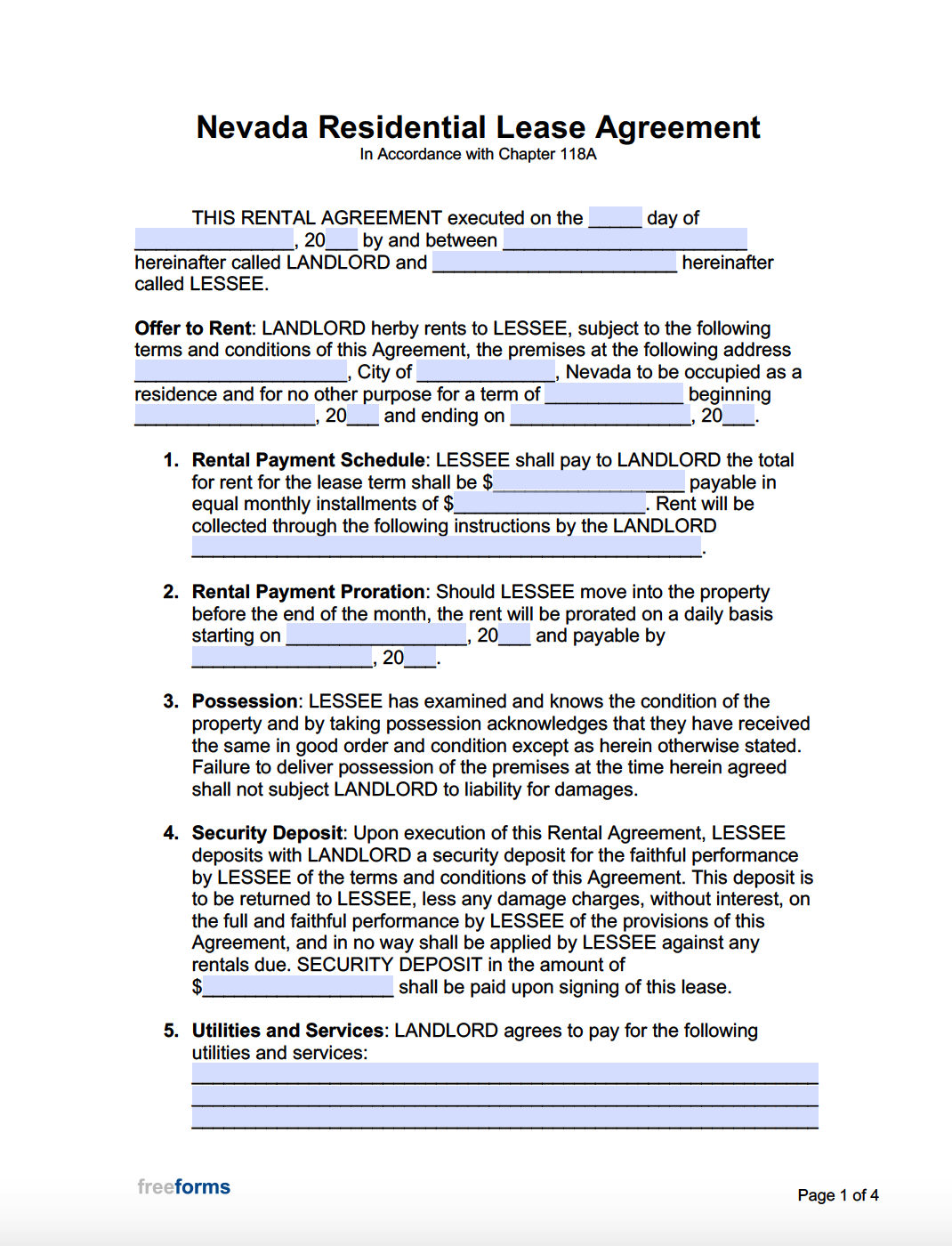
0 comments
Comments are closed.